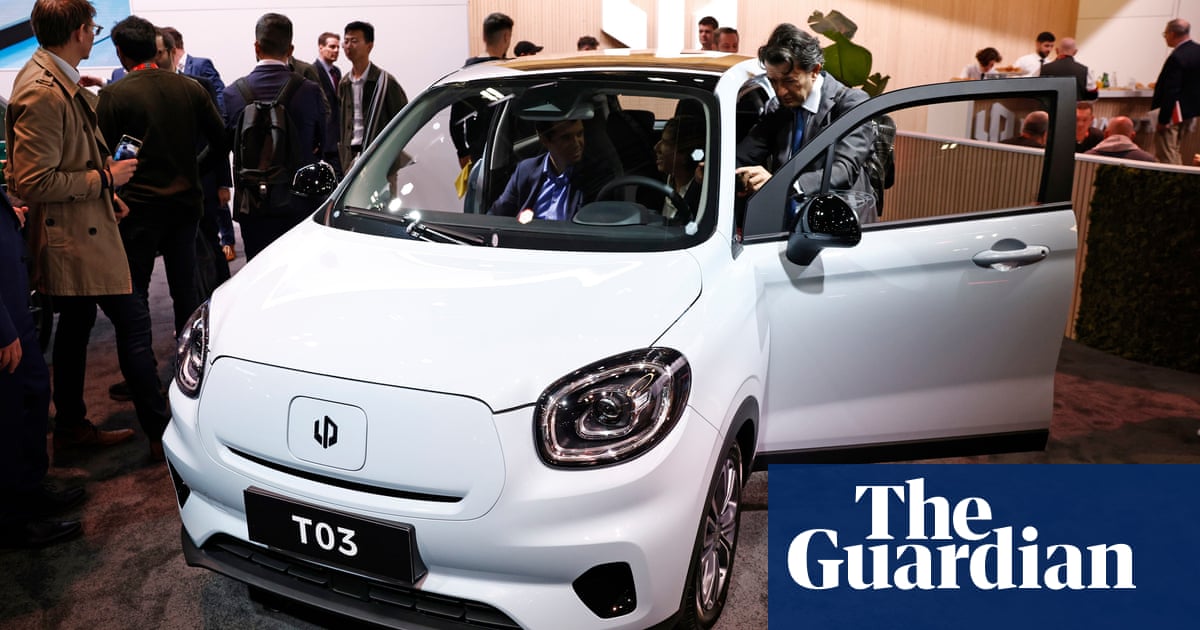For decades Germany has enjoyed a reputation as Europe’s car capital, with slogans such as Vorsprung durch Technik emblematic of its political and industrial prowess.
But troubles looming over Volkswagen, where unions are battling threats of layoffs and factory closures, have raised questions not just about its future but the wider European car industry.
Those fears have been fuelled by China muscling in on the EU’s home turf with its cheaper electric vehicles, and the slow death of the combustion engine.
The EU, US and Canada have announced plans to limit sales of Chinese-made electric vehicles with tariffs, but some European car manufacturers warn they will have a cannibalistic effect on a sector that was once the envy of the world, expediting the closure of plants in places like Germany.
The sense of urgency across the European industry was plain to see at the this Paris motor show, where Chinese manufacturers underlined their determination to eat into the European market, the biggest open to them after the US slapped 100% tariffs on electric vehicle imports.
Under spotlights on the cavernous floor of the Porte de Versailles expo centre, nine Chinese companies unveiled new cars and strategic plans to make further inroads in Europe.
Tariffs have been met with mixed reactions from the continent’s car bosses. Carlos Tavares, the boss of Stellantis, owner of Citroën, Fiat, Vauxhall and Jeep brands, said the cumulative effect of the EU tariffs would lead to further erosion of the European industry.
Photograph: Chesnot/Getty Images
He noted that in order to circumvent the tariffs, Chinese car manufacturers such as BYD, were stepping up plans to build their vehicles in Europe.
Tavares predicted Chinese brands would not be going to Germany, France or Italy, the home of Europe’s oldest carmakers, but would seek cheaper options in countries in eastern Europe such as Hungary, where labour costs are cheaper.
This, he said, would mean “accelerating the need to shut down plants” elsewhere in Europe, thereby defeating the object of protectionist tariffs due to come into force in November.
His comments highlight widening rifts at the heart of the EU over the policy. France, and its president Emmanuel Macron, who opened the Paris show, have been strongly in favour of the tariffs.
By contrast, Germany was among the minority of countries that voted against the tariffs two weeks ago. In years past the bloc’s largest economy would have been able to coax others including France into a unified position, but leadership at an EU level has not been a strong point for the German chancellor, Olaf Scholz.
So into that vacuum, the car industry has been taking on the fight. With its own economic woes – and suppressed consumer demand for EVs being worsened by the growth of China’s presence in their forecourts, German captains of industry have gone even further than Stellantis.
Instead of grabbing all the protections the EU is offering through tariffs, the industry seems to be eating itself, asking for yet more time to adjust to the new electric world.
after newsletter promotion
Oliver Zipse, the chief executive of BMW, which has been a laggard in the EV race, called for a loosening of the EU’s 2035 cut-off point for production of new combustion engine cars. A European Commission spokesperson on Thursday said it was in constant dialogue with industry but noted the 11-year target gave time to industry to prepare for the ban on petrol and diesel engines.
In a statement that further panics the European car sector, BYD, one of China’s biggest conglomerates, said it planned to make all the cars it sells in Europe locally and will assemble battery packs, the most expensive part of any EV, in Hungary and Turkey.
Geely, the owner of Volvo, Polestar and Lotus, is scouting locations in Europe including Poland while newer Chinese entrants such as Dongfeng, Seres and FAW are also showing off new models as they seek overseas EV sales to offset a weak home market and a vicious price war there.
Meanwhile, some European car brands are now rushing to work with the very Chinese rivals that are threatening their future.
Leapmotor, which partners with Stellantis, is poised to start taking orders for a city car, assembled in Poland. And according to reports from Paris on Thursday, Geely and Spotlight Automotive, a joint venture between BMW and Great Wall of China, are also trying to forge investment deals in the EU.
The European Commission has indicated that investment in Europe may be one way to avoid tariffs. But captains of the car industry fear this will just allow the competition into their backyard.
“The Europeans have massive alarm bells ringing,” said Phil Dunne, the managing director at the strategy consultancy Stax. “They have recognised they need to do something pretty radical and they only have a couple of years to do it.”

